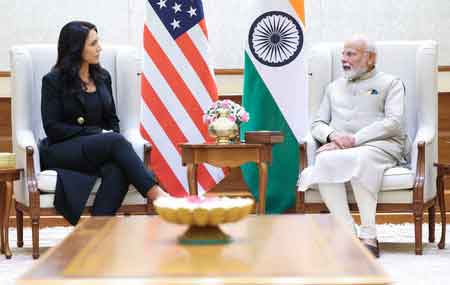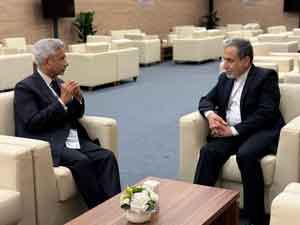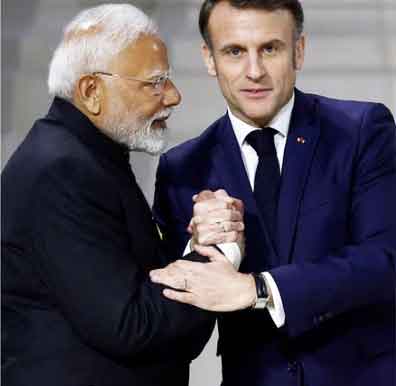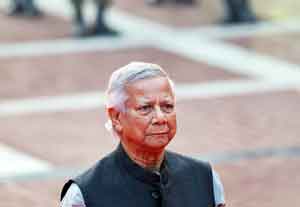Sri Lankan President Ranil Wickremesinghe said that India is the net security provider and the protector of the region.
Joining an online interview organised by Harvard University, President Wickremesinghe said that "as a small country with a strong democratic tradition and an open economy, Sri Lanka has always maintained its political independence and viewed India, its closest neighbour with the longest relations, as the protector of the region".
"The other sticky issue that we need to make into account is the smouldering big power rivalry in the Indian Ocean. While our island has always maintained its political independence, India is regarded as the net security provider in the region and is Sri Lanka's closest neighbour and the country which we have the longest ties with," Wickremesinghe, who took over as Sri Lanka President following a severe political turmoil that forced the powerful Gotabaya Rajapaksa to flee the country and the worst ever economic crisis that the country was going through since its Independence, said.
Wickremesinghe said that Sri Lanka's aim was not to have big power rivalry in the area.
"We all like to ensure that we all work with India, China, US, Japan and everyone else," he said.
He also insisted that Sri Lanka would like to see that no confrontation breaks out between India and China, and India and Pakistan.
"So far, the situation has held. Though it's the tensest place in the world with three nuclear powers. None of us want to come to a situation that we had to choose between India and China if there is a confrontation," the interview released by the President Media Unit stated.
"Then comes the third question about Sri Lanka and India and China. So far, I think India and China wants the issue to be bilateral and they have held it. There has been intervention maybe by Russia and others indirectly.
"Our job is to ensure that there is no confrontation and the easing of relations. Now, this is going to be a difficult task at the moment when the Quad is operating on one side and China on the other hand, and Ukraine has really raised the level of confrontation between the West, Russia and China though in our part of the world, we are not involved in the Ukraine issue and has kept away from taking sides," President Wickremesinghe clarified.
"But this is why I was worried that the presence of UK in the Indian Ocean and Pacific where they shouldn't be and there is military power, can make things worse. I think between us in the region we will somehow manage it. So we don't want the things to become worse and we all like to ensure that we all work with India, China, US, Japan and everyone else," he said.
Answering a question on region's growing competition between China and other countries, President Wickremesinghe said that Sri Lanka maintains a close relationship with all members of the Quad and China as well.
"Sri Lanka is also a member of the Belt and Road Initiative. However, the presence of the Chinese Sea Fleet ships and the formation of the Quad, the security dialog between Australia, India, Japan and US have complicated peace and security in the Indian Ocean. We have close ties with all the members of the Quad as well as China," he said.
"The rising level of competition between China and the Quad has further been aggravated by the newly formed 'Aukus', the pact between Australia, the US and UK. Sri Lanka, accepts the ASEAN outlook on the Indo-Pacific territories. We regard the Indo-Pacific as consisting of two distinct oceans. Our country is committed to the freedom of navigation and the security of undersea cables in the Indian Ocean," he stated.
"Therefore, it is essential for Sri Lanka's future to ensure that the issues of the Asia Pacific, especially that of Taiwan, does not spill over into the Indian Ocean," Sri Lanka President said.
He said that Sri Lanka's access to the growing Indian market as well as the opening of African markets cannot be disrupted and should not be disrupted by big power, rivalry or conflict.
"So this is a story of a country, a small country, but a country with a strong democratic tradition, with an open economy which has been non-aligned, of arising out of the ashes of its old economy, to build a new economy going hand-in-hand with the developments in the Asian region and India."
The President stressed that Sri Lanka's role in building a new economy by collaborating with the development of the Asian region and India, moving away from the old economy.
The Sri Lankan President suggested that the free trade agreement with India should be elevated to an economic cooperation and technical agreement and expressed his willingness to enter into an agreement with the largest trade group in Asia, the Regional Comprehensive Economic Partnership, which would allow Sri Lanka to continue trading with the largest trade group in the world.
Wickremesinghe also said there is lack of economic integration in South Asia and apart from a few lukewarm efforts, there has been no sincere political will to amalgamate the region's economies into a powerful trading bloc.
"It is further complicated by the flagging India-Pakistan relations. To move forward then, Sri Lanka needs trade integration with many of its neighbouring countries."
The President said that as a first effort Indian Ocean's island nation would upgrade the free trade agreement with India to an economic cooperation and technical agreement.
"This is essential. India is going to be the next growth centrE and it will trigger off growth in South Asia. We are just 22 miles away and we have to work especially to ensure that the synergies of Sri Lanka and Tamil Nadu are brought together.
"Secondly, we'd like to come to an agreement with the right to see the Regional Comprehensive Economic Partnership, Asia's largest trade bloc. But that will bring us to make the largest trade bloc in the world. And finally, as we go along, we would also like to join the comprehensive progressive Trade Agreement. With this, Sri Lanka will be integrated with the three largest trade blocs, India, RCEP and the Comprehensive and Progressive Agreement for Trans-Pacific Partnership (CPTPP)," the President said.
Responding to a question on the controversial China-run Port in southern Sri Lanka, Wickremesinghe said that China cannot use the port for military purposes.
"I can't see a military use for it and the Chinese haven't the ability to have a large number of warships in the Indian Ocean any way, to counter India and the US," he reiterated.
"We have had regular consultations with the US in regard to this port as well as dealings with the Chinese," he said .
"But looking at the arrangement at the ports that the Chinese are building in Africa and somewhere in the Bay of Bengal, this will be certainly a crucial port as far as commercial activities are concerned. I think this will be one of the ports where the goods are assembled and reshipped to other destinations," Wickremesinghe said, referring to the port that was built by China and was leased for 99 years.








Tripura CM Saha holds key meeting with BJP, IPFT and TMP leaders
Tripura Chief Minister Manik Saha on Friday held an "important" meeting between the leaders of ruling BJP and its two allies – Tipra Motha Party (TMP) and Indigenous People's Front of Tripura (IPFT) and discussed various political and developmental issue, sources said.
HM Amit Shah's meeting sends a clear message: Not a drop of water to Pakistan
A high-level meeting was held on Friday at the residence of Union Home Minister Amit Shah regarding the suspension of the Indus Waters Treaty. The 45-minute meeting between the Home Minister and Union Jal Shakti Minister C.R. Patil focused on exploring ways to halt the flow of water to Pakistan.
Tripura: TMP chief urges Centre to adopt 'stronger policy' against B'desh
Ruling BJP’s ally Tipra Motha Party (TMP) founder-chief Pradyot Bikram Manikya Debbarma on Friday urged the Central government to adopt a stronger policy stance towards Bangladesh, accusing the neighbouring country of encouraging fundamentalist forces targeting Hindu minorities.
Pahalgam attack: More countries express solidarity with India, offer support in fight against terrorism
Ambassadors of Israel, Egypt, Argentina, and Nepal met External Affairs Minister (EAM) S. Jaishankar in New Delhi on Friday, expressing solidarity with India in its fight against terrorism following the heinous terror attack in Pahalgam.
Tripura CM directs SPs and DMs to remain vigilant about Pakistani nationals
Tripura Chief Minister Manik Saha on Friday directed the Superintendents of Police (SPs) of all eight districts to regularly share necessary inputs with the Chief Minister’s Secretariat regarding the presence of any Pakistani nationals in the state, officials said.
US supports India's 'hunt' for those behind 'horrific Islamist terrorist attack' in Pahalgam, says Gabbard
Tulsi Gabbard, Director of National Intelligence (DNI), on Friday said that the United States supports India's "hunt" for the perpetrators of the "horrific Islamist terrorist attack" in Pahalgam that took place earlier this week.
Tehran stands ready to 'forge greater understanding' between India and Pakistan: Iran FM Araghchi
Citing its good relations with both India and Pakistan, Iran on Friday said that it stands ready to "forge greater understanding" between New Delhi and Islamabad following the Pahalgam terror attack, earlier this week.
PM Modi's action will act as deterrent against any fresh attempts to harm India: Tripura CM
Tripura Chief Minister Manik Saha on Friday denounced the Pahalgam terror attack, asserting his staunch belief that Prime Minister Narendra Modi's decisive action will act as a strong deterrent against any future attempts by terrorists to harm India.